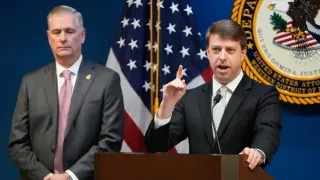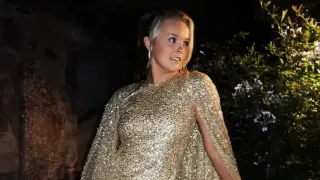September 6, 2024
EDGE Interview: New Doc Asks, Was Abraham Lincoln a 'Lover of Men?'
Kilian Melloy READ TIME: 8 MIN.
EDGE: We're told that Lincoln was our most consequential and perhaps our greatest president. Can you say a bit about that in context of the LGBTQ+ community and our willingness to embrace him as one of our own, as well as the pushback against that idea?
Tom Balcersky: As gay people, this is something we would want to do. I mean, let's be honest: Abraham Lincoln being part of the LGBT community, being part of our history, would be fabulous! Fantastic! There's no downside to this one. There's some folks in the past that, they can keep 'em. But Lincoln? We want him!
EDGE: Mr. Peterson, the film touches on how Lincoln's supposed sexual inclinations could have made him more sensitive to the plight of Black people in America during a time when slavery was still in effect. Can you say a little about that?
Shaun Peterson: On a historical level, when Joshua Speed moved back to his family's plantation, Lincoln went and visited him. That would have been the first time Lincoln would have witnessed slaves working on a plantation. He spent over a month there, witnessing it, and it was a harsh environment. This was a hemp plantation, so the sticky hemp flower got into the lungs of the slaves, and it was a harsh thing to witness. A lot of scholars who would say that Lincoln's exposure to this really informed his viewpoints on slavery that he was already forming at the time.
In general, Lincoln [demonstrated] open-mindedness throughout his presidency. Frederick Douglass came in and really made the point for abolition, and you see Lincoln bringing his political rivals onto his cabinet. It'd be like Trump bringing Bernie Sanders onto his cabin; [it would be] unheard of today. His empathy proved him to be what I think of as our greatest president, and [that sort of empathy] is something that's really missing from the political landscape today.
EDGE: Can we really apply modern notions of sexuality to historic figures?
John Stauffer: Shaun read deeply. He went back to the 19th century understandings of sexuality. I think part of the brilliance of the film is the long arc that it portrays; it focuses on Lincoln, but highlights the degree to which, in many regards, our understanding of sexuality in the 19th century was much more fluid, much more open, much more, in a sense, egalitarian. The terms bisexuality, homosexuality, heterosexuality weren't invented [in Lincoln's day]. Once those terms become codified, it's a way of creating rigid hierarchies to such a degree [that] it's a prison term if you're found having carnal relations with another man [or] another woman.
Lincoln and Joshua speed [were] intimate; Speed later said that no man, no two men, have ever been more intimate, and that was echoed by Robert Todd Lincoln, his son. Intimacy in the 19th century meant that two men or two women were equal. But intimacy [was] also physical, and that was seen as acceptable.... it was so common in that period, that for two men or for two women to show their love for each other was far more accepted than it would be in the 20th century.
EDGE: It feels like we are at America's most consequential and fraught moment since the 1960s, if not the 1860s.
Tom Balcersky: The stakes are as high as in Lincoln's day. The nation was on the brink of civil war, and within months was fighting the longest, bloodiest, most deadly conflict in American history. Knowing that we had a great leader like Lincoln coming out of nowhere to save American democracy, there's a kind of triumphant narrative – ultimately a bittersweet, very tragic one, given his untimely death and the tragedies of the Civil War. That's what we hope [an understanding of] history does; it helps to uplift and give us hope.
Shaun Peterson: And it's no accident we're injecting Lincoln into the national discussion right before the election, as a reminder of a leader who made tremendous sacrifices to save the nation. Lincoln was open minded and loving and had all these layers. [He] had deep love and caring for others throughout his life, and these experiences informed who he eventually became.
"Lover of Men" premieres in theaters on Sept. 6. Note: The film has partnered with the Human Rights Campaign. Those who purchase tickets to see the film in theaters this weekend via this custom link will directly benefit The Human Rights Campaign.






